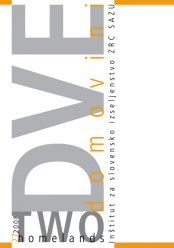Return Durability as a Physical and Synthetical Indicator of Sustainability. Example of the Serb Returnees in Croatia
Keywords:
refugees, returnees, Croatia, Serbs, sustainability of return, types of returneesAbstract
Traditional understanding of refugee return as one-time and a definite act has recently been vigorously criticized by the theoreticians and researchers in refugee studies. It seems that in a short period of time opinion prevailed that return is always a complex long-term and diversified process, which in each of its phases can become reversible. Filed researches already ‘revealed’ that many returnees do not stay actually in their places and homeland of origin but re-emigrate. This finding has lead to conclusion that simple crossing of boarder in opposite direction is not the real indicator of return. Instead, it should be successful i.e. sustainable. The most common ‘measure’ of sustainability is absence of repeated migration. The authors have conceptualized and operacionalized seven aspects of return sustainability: I. the extent of return durability; II. feeling of safety; III. socio-demographic characteristics of returnees; IV. socio-economic conditions; V. refugee experience and orientation towards return; VI. citizenship and minority rights; VII. subjective perception of living conditions. Here are only findings relating to the first dimension presented and discussed, accompanied by the returnee typology proposed by the authors, in order to better understand complexity of return movements. They differentiate the following types of returnees: A) unconditional permanent; B) conditional permanent; C) semi-returnees or transnational; D) non-formal; E) formal or quasi-returnees.
Downloads
References
Allen, T. and H. Morsnik (eds.) (1994) When Refugees go Home: African Experiences, James Currey, Oxford.
Black, R. (2002) „Conceptions of 'home' and the political geography of refugee repatriation: between assumption and contested reality in Bosnia-Herzegovina“, Applied geography, 22, 123-138.
Black R., et al. (2004) „Understanding voluntary return“, Home Office Online Reports, Home Office, London.
Black, Richard and Saskia Gent (2006) „Sustainable return in Post-conflict Context“, International Migration, vol. 44 (3), 15-38.
Black, Richard, Marita Eastmond, Saskia Gent (2006) „Introduction: Sustainable return in the Balkans: Beyond Property Restitution and Policy“, International Migrations, 44 (3), 5-13.
Black, Richard, Saskia Gent (2004) „Defining, Mesuring and Influencing Sustainable Return: The Case of the Balkans“, Working Paper 7, Development Research Centre on Migration, Globalisation and Poverty, University of Sussex.
Brajdić-Vuković, M., Bagić, D. (2004a) Motivational and emotional factors for the return of refugees to their homes and the acceptance of their return by the local population. Zagreb: OSCE.
Čukur, M. (2005) „Dilemas of return – two anthropological case studies“, u: M. Čukur et al., Returninng Home: An Evaluation of Sida's Integrated Area Programme in Bosnia-Herzegovina, Sida, Stockholm.
Eastmond, Marita (2006) „Transnational Returns and Reconstruction in Post-war Bosnia and Herzegovina, International Migration, 44 (3), 141-164.
Hammond, L. (1999) „Examining the discourse of repatriation: towards a more proactive theory of return migration“, u: Black, R. and Koser, K. (eds.), The End of Refugee Cycle? Refugee repatriation and Reconstruction, Oxford: Berghahn, 227-244.
Harvey, Joanna (2006) „Return Dynamics in Bosnia and Croatia: A Comparative Analysis“, International Migration, 44 (3), 89-112.
Malkki, L. H. (1992) „National geographic: the rootingof peoples and the territorialization of national identity among scholars and refugees“, Cultural Anthropology, 7.
Mesić, Milan (1992) Hrvatske izbjeglice i prognanici, Osjetljivi i ljuti ljudi, Zagreb: Ured za Prognanike i izbjeglice Vlade RH, Institut za migracije i narodnosti Sveučilišta u Zagrebu.
Migration DRC (2005) (Development Research Centre on Migration, Globalisation & Poverty), Briefing, No. 3, July, University of Sussex, 1-4
UNHCR (1997) The State of the World's Refugees, Geneva.
UNMIK and UNHCR (2003) Manual for Sustainable Return, United Nations Mission in Kosovo/UNHCR, Pristina.
Downloads
Published
How to Cite
Issue
Section
License

This work is licensed under a Creative Commons Attribution-NonCommercial-NoDerivatives 4.0 International License.
Authors guarantee that the work is their own original creation and does not infringe any statutory or common-law copyright or any proprietary right of any third party. In case of claims by third parties, authors commit their self to defend the interests of the publisher, and shall cover any potential costs.
More in: Submission chapter





